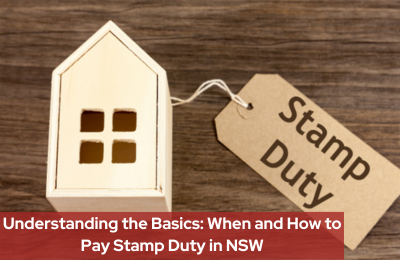Conveyancer vs. Settlement Agent: Which One Should You Hire for Your Property Sale?
When you’re at the end of finalising a property purchase in New South Wales (NSW), there’s a crucial step that should never be overlooked – the pre-settlement inspection. This provides the opportunity to thoroughly assess the property’s condition before completing the purchase. Navigating the legalities, paperwork, and coordination involved in property sales requires expertise and experience. This is where a conveyancer or settlement agent steps in. Their specialised knowledge ensures that the entire process proceeds seamlessly.
Role of Conveyancer and Settlement Agent
As a property owner, you may be wondering whether you should hire a conveyancer or settlement agent to help with your sale. Both can provide valuable services and support throughout the process. However, there are some key differences between the two:
- Conveyancer – A conveyancer is primarily responsible for ensuring that all of the legal requirements are met in order for the transfer of ownership to be completed. This includes conducting searches, preparing documents and liaising with all parties involved in the sale.
- Settlement Agent – A settlement agent, on the other hand, is responsible for coordinating the entire settlement process from start to finish. This includes arranging inspections, preparing settlement statements and managing the exchange of funds between buyers and sellers.
The choice between a conveyancer and a settlement agent depends on your preferences and requirements. If you prefer to have someone manage everything from start to finish, then a settlement agent may be a better option for you. However, if you feel comfortable handling some of the tasks yourself and just need someone to take care of the legalities, then a conveyancer may be a better choice.
What Does a Conveyancer Do?
A conveyancer is a licensed professional who specialises in the legal transfer of property ownership. They are responsible for ensuring that all the legal requirements associated with property ownership transfers are met. This includes preparing and lodging transfer documents, conducting searches, as well as liaising with other professionals involved in the sale. If you’re selling your home, you’ll need to use a conveyancer. If you’re buying a home, you may want to use a settlement agent to help you finalise the purchase.
What Does a Settlement Agent Do?
A settlement agent is responsible for conducting the final stage of the sale of a property. This includes transferring ownership of the property from the seller to the buyer, as well as handling any outstanding payments or debts associated with the property. The settlement agent will also prepare all of the necessary documents for the transfer of ownership and provide guidance to both parties throughout the process.
These agents are typically used by buyers to help them finalise the purchase of their new home. Settlement agents coordinate with the buyer’s lender, real estate agent, and conveyancer. This way, they ensure that all the necessary paperwork is completed and that the settlement process goes without a hitch.
Advantages of Each Role in Property Sale
Both conveyancers and settlement agents offer distinct advantages in the property sale process. Choosing between the two depends on your specific needs and preferences. Here’s a breakdown of the advantages of each role:
Conveyancer:
- Provides expert guidance: They are specialists in property law and can provide expert guidance throughout the entire sale process – from start to finish.
- Negotiates terms and liaises: They can also help to negotiate terms on your behalf and liaise with other professionals, such as mortgage brokers. This ensures all processes are taken care of.
- Offers local area expertise: A good conveyancer will also have an in-depth knowledge of the local area. This can be extremely helpful if you’re not familiar with the location yourself.
Settlement Agent:
- Manages the final stages: A settlement agent is responsible for overseeing the final stages of the sale. This includes the exchange of contracts and coordination of the settlement date among other aspects.
- Liaises with all parties: They will also liaise with all parties involved in the sale, such as the buyer’s conveyancer. Hence, everyone is on track and ready for settlement.
- Provides a fixed-fee service: These agents are often able to offer a fixed-fee service, which can be helpful if you’re working on a tight budget.
How Can You Choose Between a Conveyancer and Settlement Agent?
Deciding between a conveyancer and a settlement agent depends on your specific requirements and the stage of the property sale process. However, there are a few key things to consider before deciding which professional you need for your property sale.
Here are some aspects to keep in mind:
- Cost: First, consider the cost of each service. Conveyancers typically charge by the hour, while settlement agents often charge a flat fee.
- Role and comfort level: Evaluate your own involvement and comfort level in the sale process. If you prefer a hands-on approach, a conveyancer might be more suitable. However, if you’d rather have a professional oversee the entire process, a settlement agent could be the better choice.
- Experience: Consider the experience of each professional. Conveyancers must be licensed in order to practise. Meanwhile, settlement agents do not need to be licensed to do so.
- Services: Consider the services each professional offer. Conveyancers can provide advice on a range of legal matters related to your property sale. On the other hand, Settlement agents can help facilitate the transfer of ownership and provide other administrative services.
- Timeline and efficiency: Evaluate the timeline and efficiency each professional can offer. Conveyancers and settlement agents should be able to provide estimates for how long the process might take and how proactive they are in moving the process forward.
Questions to Ask Before Hiring
When considering conveyancers and settlement agents for your property sale, it’s important to consider all aspects to make an informed decision. It’s essential to ask relevant questions to both conveyancers and settlement agents. Inquire about their experience, fees, communication methods, and the specific services they offer. This will help you gauge their suitability for your property sale.
Here are some questions that might come in handy:
- What’s the estimated total cost for the services you need?
- How long will the process take?
- What is your experience in handling property sales?
- Do you have any specialities or areas of expertise?
- Are you licensed and insured?
- Do you have any reviews or testimonials from past clients?
When it comes to choosing a professional to help with the sale of your property, you have two main options: a conveyancer or a settlement agent. In most cases, both will be able to get the job done in an efficient and cost-effective manner. Ultimately, it depends on which one best fits your needs and preferences.
When it comes to selecting a conveyancer or settlement agent, expertise and reliability are paramount. At SD Conveyancing, our licensed conveyancers and settlement agents streamline your property dealings, offering both offline and online settlements. We offer comprehensive services and personalised solutions. From local knowledge to efficient execution, we’re here to guide you through the entire process. Contact us today on 0432 599 373 or email us at seema@sdconveyancing.au to experience hassle-free property transactions.







